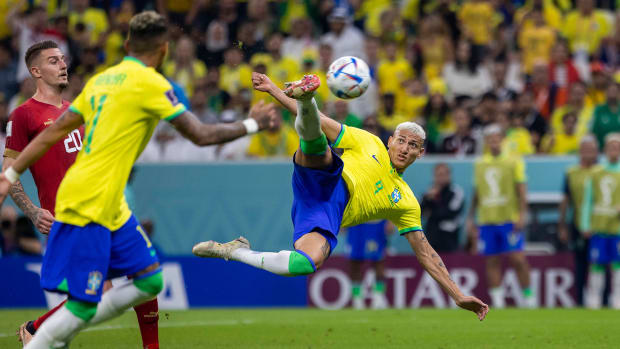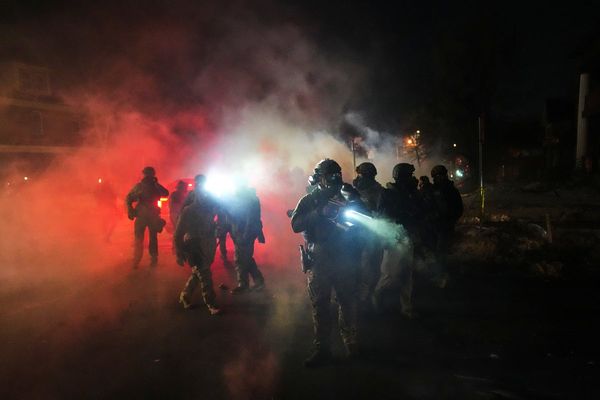As starts go, that was pretty impressive. Richarlison’s two goals, the second of which will remain on World Cup highlight reels for ages, gave Brazil a 2–0 win over Serbia on Thursday, and while there will be sterner tests to come, this was a game that asked Brazil a lot of questions and it answered the vast majority of them. Brazil had not lost its first game at a World Cup since 1934, but, as Argentina and Germany’s defeats had shown, nothing can be taken for granted. At the very least, barring a major shock against Switzerland on Monday, qualification for the last 16 should not really be in doubt.
Brazil arrived at the World Cup widely hailed as the tournament favorite, having lost just one of its previous 29 games—a run in which it had recorded some notable victories and scored liberally. The doubt was threefold: since losing in the quarterfinals of the last World Cup against Belgium, Brazil had played only one European team, a 3–1 win over the Czech Republic in March 2019. Could it cope against the physicality and intensity of the best if Europe?
Secondly, and relatedly, was a defensive midfield featuring two of Casemiro and Lucas Paqueta or even Fred enough to support a bank of three creators—against Serbia, it was Vinicius Junior, Neymar and Raphinha—playing behind Richarlison? And how, temperamentally, would a volatile forward line cope if matches did not run smoothly?

Moritz Mueller/Imago Images
To the first two issues, there is a new clarity. Against a team of Serbia’s standing, there is no real problem. This was certainly a physical test and Brazil passed it. That there was little play-acting or apparent frustration suggested the third point might not be such a problem as it has been in the past. Even Neymar was relatively phlegmatic.
With Dušan Vlahović relegated to a substitute’s role with a groin injury and Aleksandar Mitrović playing despite not having fully recovered from a foot problem of his own, this was far from a peak Serbia, but, as it has been habitually under Dragan Stojković, it was well-organized, playing crisp, intelligent football, supported by a platform of bruising defenders. The best chance before halftime was the result of a slightly freakish moment, as Nikola Milenković, in clearing a ball, smacked it into his own face. The ball ran on for Vinícius Jünior, but Milenković recovered well to prevent the Real Madrid forward from getting his shot away.
The reaction of the Serbian players as they left the pitch at halftime said much for their approach and how well they felt it had gone, as they high-fived and congratulated each other. The question, then, was whether they could sustain their concentration and hold out this enormously gifted Brazilian forward line for a full 90 minutes.
Problems soon became apparent, as an attempt to play out from the back within the first minute of the second half let Raphinha in. He, though, side-footed his shot into the body of the goalkeeper Vanja Milinković-Savić. There was a sense of a gathering storm, some wild challenges and some superbly timed tackles. As Brazil ratcheted up the intensity, so Serbia began to look ragged.
This, it felt, was for real: a challenger for the title being properly tested by an emergent side, both praised in the buildup, both optimistic, and both trying to work out then limits of their ability. Serbia, which finished above Portugal in World Cup qualifying, has a habit of promising much and delivering little at major tournaments, but there has been a sense that this is a more robust squad under Stojković, a team that is not just skillful but also has self-belief.
It could not, though, hold out forever. On the hour mark, Alex Sandro zipped a shot from 30 yards against the base of the post, from where it ricocheted across goal and to safety, half an inch, perhaps less, from opening the scoring. Two minutes later, the breakthrough did arrive. Neymar was the creator, forcing his way into the left side of the box, and, when the ball broke for Vinícius, his shot was parried in front of the goal, where Richarlison lurked, onside, to knock it in.
But the best was yet to come. As Serbia chased an equalizer, it inevitably left space. Vinícius got away down the left and crossed for Richarlison, whose first touch sent the ball spinning over his shoulder. As it dropped, he pivoted and smashed a falling volley past Milinković-Savić, a stunning goal that evoked every cliché of the genius of Brazilian football.
The final result could have been significantly more drastic than a two-goal win, as Casemiro sent a curler against the bar, and Milinković-Savić made a couple of fine saves, but it was fitting that Richarlison’s acrobatic effort should crown an exceptional second-half display. If there was a downside to the result, it’s that Neymar was forced off with an apparent ankle injury, its severity not fully known. This Brazil has an abundance of options in its attack, though, and three years ago, it won Copa América on home soil without him. Its unit is stronger than one single talent. Perhaps this World Cup, after 20 years of disappointment, is Brazil’s time to reign again.







